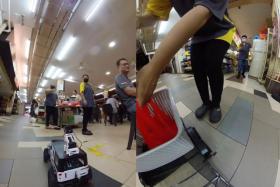Probe on data practices intensifies
Mark Zuckerberg called on to testify over Facebook data leak; Britain seeks warrant to raid Cambridge Analytica offices
LONDON: British privacy regulators are seeking a warrant to search the offices of the political consultancy Cambridge Analytica following reports that the company may have improperly gained access to data on 50 million Facebook users, according to a Channel 4 television report.
The move came as US and European lawmakers demanded an explanation of how the consulting firm, which worked on US President Donald Trump's election campaign, gained access to the data.
In the US, members of Congress called on Facebook chief executive Mark Zuckerberg to testify about Facebook's actions.
Facebook said it had hired forensic auditors from the firm Stroz Friedberg to investigate and determine whether Cambridge Analytica still had the data, Reuters reported.
"Auditors from Stroz Friedberg were on site at Cambridge Analytica's London office this evening," the company said in a statement late on Monday.
"At the request of the UK Information Commissioner's Office, which has announced it is pursuing a warrant to conduct its own on-site investigation, the Stroz Friedberg auditors stood down."
"The lid is being opened on the black box of Facebook data practices, and the picture is not pretty," said Mr Frank Pasquale, a University of Maryland law professor who has written about Silicon Valley's use of data.
A British parliamentary committee yesterday asked Mr Zuckerberg to appear before it, AFP reported.
'CATASTROPHIC FAILURE'
Mr Damian Collins, chairman of the House of Commons Digital, Culture, Media and Sport Committee, wrote to Mr Zuckerberg asking for his account of "this catastrophic failure of process".
The lid is being opened on the black box of Facebook data practices, and the picture is not prettyUniversity of Maryland law professor Frank Pasquale
Mr Collins wrote: "It is now time to hear from a senior Facebook executive with the sufficient authority to give an accurate account of this catastrophic failure of process.
"Given your commitment at the start of the New Year to 'fixing' Facebook, I hope that this representative will be you."
Mr Collins set Mr Zuckerberg a deadline of March 26 to reply.
Also on Monday, a source said that Facebook head of security Alex Stamos plans to leave the company over disagreements about the company's policies on misinformation.
In a tweet, Mr Stamos did not deny he was leaving but said: "Despite the rumours, I am still fully engaged with my work at Facebook. It is true that my role did change."
London-based Cambridge Analytica said it strongly denied the media claims, and that it deleted all Facebook data it obtained from a third-party application in 2014 after learning the information did not adhere to data protection rules.
Republican Senator John Kennedy called on Mr Zuckerberg to testify before Congress, and Democratic Senator Ron Widen sent a letter to Mr Zuckerberg asking about company policies for sharing user data with third parties.
A spokesman for British Prime Minister Theresa May said the allegations were "clearly very concerning".
Meanwhile, Channel 4 aired a video on Monday apparently showing Mr Alexander Nix, the head of Cambridge Analytica, talking about using bribes, traps involving sex workers and other unethical tactics to swing elections around the world.
In the video, he appears to suggest the company could "send some girls around to the candidate's house", Washington Post reported.
He later added that he favoured Ukrainian women in particular: "They are very beautiful. I find that works very well."
The surreptitiously recorded video also appears to depict conversations involving Mr Nix, Mr Mark Turnbull, the managing director of Cambridge Analytica Political Global, and Mr Alex Tayler, the chief data officer.
The executives repeatedly appear to brag about their behind-the-scenes efforts to influence political outcomes in Malaysia, Mexico, Australia and Kenya, at one point teasing that they are beginning to work in China too.
Get The New Paper on your phone with the free TNP app. Download from the Apple App Store or Google Play Store now


